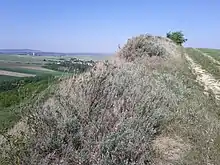Krascheninnikovia ceratoides
Krascheninnikovia ceratoides, the Pamirian winterfat,[2] is a plant species native to Central Europe and Southern Europe, North Africa, and parts of Asia.[3] It has been reported from Russia, China, Mongolia, Pakistan, Kazakhstan, Uzbekistan, Iran, Afghanistan, Ukraine, Egypt, Morocco, Spain, Austria, Slovakia, Czech Republic, and Romania.[4][5][6][7][8][9][10]
| Krascheninnikovia ceratoides | |
|---|---|
 | |
| Krascheninnikovia ceratoides in Austria | |
| Scientific classification | |
| Kingdom: | Plantae |
| Clade: | Tracheophytes |
| Clade: | Angiosperms |
| Clade: | Eudicots |
| Order: | Caryophyllales |
| Family: | Amaranthaceae |
| Genus: | Krascheninnikovia |
| Species: | K. ceratoides |
| Binomial name | |
| Krascheninnikovia ceratoides (L.) Gueldenst. | |
| Synonyms[1] | |
| |
Krascheninnikovia ceratoides is a shrub up to 100 cm tall, appearing whitish because of a thick layer of finely branched hairs. Leaves are highly variable in shape, up to 25 mm long. Flowers are tiny, covered with long silky hairs, borne in axillary clusters and a terminal raceme; staminate (male, pollen-producing) and pistillate (female, seed-producing) organs are in different flowers on the same plant. Fruit is egg-shaped, about 3 mm long, with 4 angles and 2 horns.[3][11]
References
- The Plant List
- USDA, NRCS (n.d.). "Krascheninnikovia ceratoides". The PLANTS Database (plants.usda.gov). Greensboro, North Carolina: National Plant Data Team. Retrieved 29 May 2015.
- Flora of Pakistan V 204.
- Flora of Romania, Endangered Species of Transylvania
- Meyer, Carl Anton (Andreevič) von. 1833. Flora Altaica 4: 239–240.
- Flora Silvestre del Mediterráneo, Krascheninnikovia ceratoides
- Czech Botany
- Virtual Guide to the Flora of Mongolia
- Gobierno de Aragón, Catálogo de Especies Amaenazadas de Aragón, Krascheninnikovia ceratoides
- Walter Wucherer, Liliya A. Dimeyeva. 2012. Aralkum - a Man-Made Desert: The Desiccated Floor of the Aral Sea (Central Asia). Springer Verlag.
- Gueldenstaedt, Anton Johann von. 1772. Novi Commentarii Academiae Scientiarum Imperalis Petropolitanae 16: 548, 555.